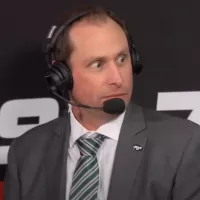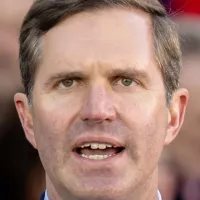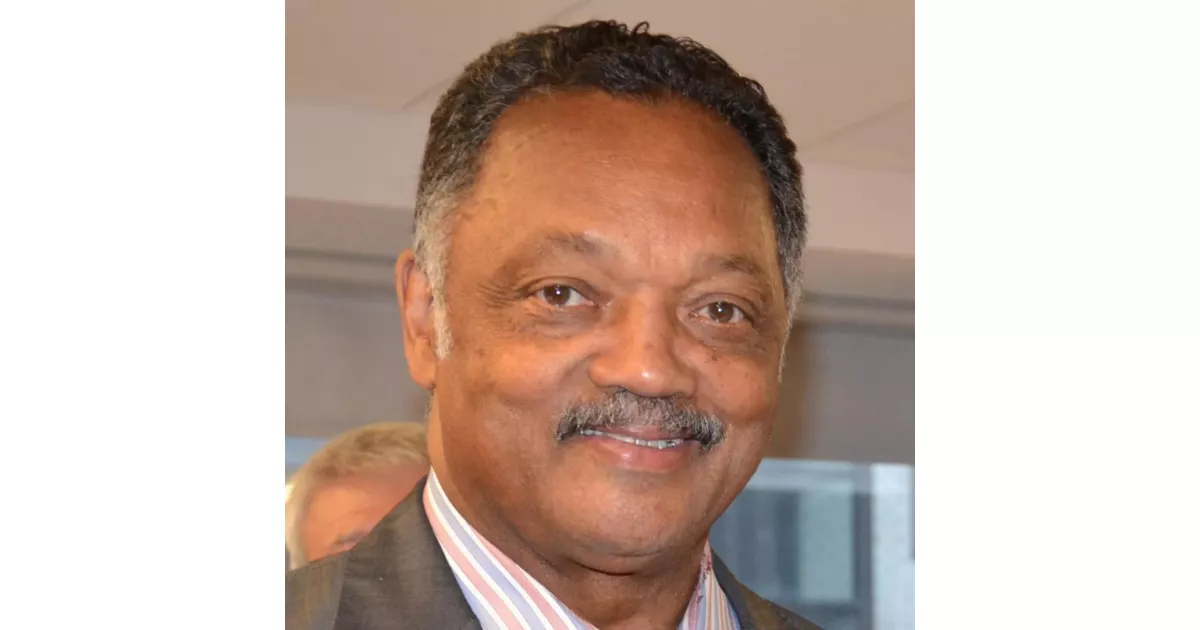Jesse Louis Jackson is a prominent American civil rights activist, politician, and Baptist minister. He rose to prominence as a protégé of Martin Luther King Jr. during the Civil Rights Movement and has remained a leading figure in civil rights advocacy for decades. He served as a shadow delegate and senator for the District of Columbia from 1991 to 1997. Jackson is also the father of former U.S. Representative Jesse Jackson Jr. and current U.S. Representative Jonathan Jackson.
1908: Birth of Noah Louis Robinson
In 1908, Noah Louis Robinson, Jesse Jackson's biological father, was born.
1924: Birth of Helen Burns
In 1924, Helen Burns, Jesse Jackson's mother, was born.
October 8, 1941: Jesse Jackson Born
On October 8, 1941, Jesse Louis Jackson, né Burns, was born. He is an American civil rights activist, politician, and ordained Baptist minister.
1944: Birth of Jacqueline Lavinia Brown
In 1944, Jacqueline Lavinia Brown, who would later marry Jesse Jackson, was born.
1955: Montgomery Bus Boycott Impact
In 1955, the Montgomery bus boycott influenced Jesse Jackson to reject segregation practices.
1959: Rejection of Baseball Contract
In 1959, Jesse Jackson rejected a contract from a minor league professional baseball team to attend the University of Illinois.
July 16, 1960: Greenville Public Library Sit-in
On July 16, 1960, Jesse Jackson participated in a sit-in at the Greenville Public Library and was arrested for "disorderly conduct".
1960: University of Illinois
In 1960, sociologist Harry Edwards suggested that Jackson had left the University of Illinois because he had been placed on academic probation
December 31, 1962: Marriage to Jacqueline Lavinia Brown
On December 31, 1962, Jesse Jackson married Jacqueline Lavinia Brown.
1963: Birth of Santita Jackson
In 1963, Santita Jackson, one of Jesse Jackson's children, was born.
1964: Graduation from A&T
In 1964, Jesse Jackson graduated from North Carolina A&T with a B.S. in sociology.
1965: Birth of Jesse Jackson Jr.
In 1965, Jesse Jackson Jr., one of Jesse Jackson's children, was born.
1965: Participation in Selma to Montgomery Marches
In 1965, Jesse Jackson participated in the Selma to Montgomery marches, organized by James Bevel, Martin Luther King Jr., and other civil rights leaders in Alabama.
1966: Drops out of Seminary
In 1966, Jesse Jackson dropped out of the Chicago Theological Seminary to focus on the civil rights movement.
1966: Birth of Jonathan Luther Jackson
In 1966, Jonathan Luther Jackson, one of Jesse Jackson's children, was born.
1966: Head of Chicago Branch of SCLC
In 1966, King and Bevel selected Jackson to head the Chicago branch of the SCLC's economic arm, Operation Breadbasket.
1967: Promoted to National Director
In 1967, Jackson was promoted to national director of Operation Breadbasket.
April 4, 1968: King's Assassination
On April 4, 1968, Martin Luther King Jr. was assassinated. Jackson was in the parking lot one floor below and claimed to be the last person to speak to King, though this account was disputed.
1968: Ordained as a Minister
In 1968, Jesse Jackson was ordained a minister.
1969: Viewed as King's Successor
In 1969, The New York Times reported that several black leaders viewed Jackson as King's successor.
1970: Birth of Yusef DuBois Jackson
In 1970, Yusef DuBois Jackson, one of Jesse Jackson's children, was born.
October 1971: Black Expo in Chicago
In October 1971, Jesse Jackson organized the Black Expo in Chicago, a trade and business fair to promote black capitalism and grass roots political power.
December 1971: Falling Out with Abernathy
In December 1971, Jesse Jackson and Ralph Abernathy had a complete falling out, leading to Jackson's suspension as leader of Operation Breadbasket. Al Sharpton left the SCLC to protest Jackson's treatment.
December 25, 1971: Operation PUSH Begins
On December 25, 1971, People United to Save Humanity (Operation PUSH) officially began operations. Jackson planned to orient Operation PUSH toward politics.
1971: Named One of Ebony's Most Influential Black Americans
In 1971, Jesse Jackson was named to Ebony Magazine's "100 most influential black Americans" list.
1975: Birth of Jacqueline Lavinia Jackson
In 1975, Jacqueline Lavinia Jackson, one of Jesse Jackson's children, was born.
1978: Call for Closer Relationship with Republican Party
In 1978, Jesse Jackson called for a closer relationship between blacks and the Republican Party.
1978: Meeting with James Earl Ray
In 1978, Jesse Jackson met with James Earl Ray, the convicted assassin of Martin Luther King Jr., for four hours.
1979: Jackson Receives Jefferson Award
In 1979, Jesse Jackson received the Jefferson Award for Greatest Public Service Benefiting the Disadvantaged.
1980: Voter Turnout Increase
In 1980, massive voter registration drives targeting black voters led to a 69 percent increase in voter turnout from in Georgia and Alabama during Jackson's run.
May 1983: Address to Alabama Legislature
In May 1983, Jesse Jackson became the first African-American man since Reconstruction to address a joint session of the Alabama Legislature, advocating for unity based on employment status rather than race, signaling a potential presidential candidacy.
November 3, 1983: Announcement of Presidential Campaign
On November 3, 1983, Jesse Jackson announced his campaign for president of the United States in the 1984 election, becoming the second African American to mount a nationwide campaign for president as a Democrat.
1983: Boycott against Anheuser-Busch
In 1983, Jesse Jackson and Operation PUSH led a boycott against beer giant Anheuser-Busch, criticizing their minority employment levels.
1983: Travel to Syria to secure the release of a captured American pilot
In 1983, Jesse Jackson traveled to Syria and successfully negotiated with President Hafez al-Assad for the release of captured American pilot Navy Lt. Robert Goodman.
January 4, 1984: Reagan Welcomes Jackson and Goodman to White House
On January 4, 1984, after Jesse Jackson successfully negotiated the release of Navy Lt. Robert Goodman from Syria, President Reagan welcomed both Jackson and Goodman to the White House. This event increased Jackson's popularity and served as a springboard for his 1984 presidential run.
March 1984: Jackson's Support in Primaries and Polls
In March 1984, a Washington Post-ABC News poll placed Jesse Jackson in third place with 20 percent support during his presidential campaign, noting his success in unifying and raising the expectations of black voters.
June 1984: Jackson Negotiates Release of Americans in Cuba
In June 1984, Jesse Jackson, upon invitation by Fidel Castro, negotiated the release of 22 Americans who were being held in Cuba.
1984: Address to Democratic National Convention
In 1984, Jesse Jackson addressed the Democratic National Convention, offering an apology for comments considered derogatory to Jews and reaffirming his loyalty to the party.
1984: Petition to Halt Execution
In 1984, Jesse Jackson and Coretta Scott King sent letters asking Florida governor Bob Graham to halt the execution of James Dupree Henry.
1984: Jackson Criticized for Anti-Semitic Remarks
In 1984, Jesse Jackson faced criticism for using anti-Semitic slurs, which strained his relationship with the Jewish community.
1984: Presidential Campaign
In 1984, Jesse Jackson launched a presidential campaign. He finished in third place for the Democratic nomination.
1984: Formation of Rainbow Coalition
In 1984, Jesse Jackson organized the Rainbow Coalition and resigned as president of Operation PUSH to run for president.
1984: Jackson uses pejorative term for Jews
In 1984, Jesse Jackson was criticized for referring to Jews as "Hymies" and New York City as "Hymietown" in remarks to a Washington Post reporter, mistakenly believing they wouldn't be printed. Louis Farrakhan further complicated the situation by warning that any harm to Jackson would be the last.
1984: 25th Anniversary of Presidential Campaign
In November 2009, the Congressional Black Caucus honored Jesse Jackson for the 25th anniversary of his 1984 presidential campaign.
January 1985: Procession in Washington to Washington Monument
In January 1985, concurrent with the second inauguration of Ronald Reagan, Jesse Jackson led supporters in a procession through Washington to the Washington Monument to advocate for the poor.
June 1986: Commencement Speech at Medgar Evers College
In June 1986, Jesse Jackson delivered a commencement speech at Medgar Evers College, expressing concerns about ethical and spiritual decline among young people and the rise of drug use.
1986: Speculation of Second Presidential Run
In early 1986, speculation began that Jesse Jackson would mount a second presidential run in 1988.
March 1987: Formation of Exploratory Committee
In March 1987, Jesse Jackson formed an exploratory committee for a potential presidential run, after Gary Hart.
April 1987: Campaigning in Iowa
In April 1987, Jesse Jackson spent six days campaigning in Iowa and moved his office to a rural area, emphasizing the shared economic struggles of farmers, businessmen, and unemployed blacks.
October 11, 1987: Announcement of Candidacy in 1988 Presidential Election
On October 11, 1987, Jesse Jackson announced his candidacy in the 1988 presidential election, leading in polls in nine of the 12 Southern states.
November 1987: Media and Analysts' Assessment of Jackson's Candidacy
In November 1987, a New York Times article highlighted that most political analysts gave Jesse Jackson little chance of being nominated in the presidential race, citing factors such as his race and his liberal political stance.
1987: Jackson Attempts to Improve Jewish Relations
According to a 1987 New York Times article, after 1984, Jesse Jackson began attempting to improve his relationship with the Jewish community.
1987: Jackson praised as a successful black leader
In 1987, Donald Rheem described Jesse Jackson as "one of the most successful black leaders in American history", acknowledging his 25 years of public service which included voter registration drives, inner-city economic development, and advocating for a moral message that urged black individuals to stay away from drugs and pursue fulfilling lives.
1987: Involvement in Chicago Mayoral Election
In 1987, Jesse Jackson intervened in the Chicago mayoral election to prevent the deterioration of the Democratic campaign and avoid a split in the Democratic vote, amidst concerns about Harold Washington's reelection.
1987: Jackson's Campaign Platform
In 1987, Jesse Jackson's campaign platform included a single-payer system of universal health care, higher taxes on the wealthy, defense spending cuts, the Equal Rights Amendment, drug control, and infrastructure investment.
1987: PUSH's Activities and Debt
In 1987, Operation PUSH's activities included boycotts and programs for housing, social services, and voter registration. The organization was imperiled by debt.
1987: Clean Transcript
In 1987, the University of Illinois' president reported that Jackson's 1960 freshman year transcript was clean and said he would have been eligible to re-enroll at any time.
1988: Meeting with Dukakis and Democratic National Convention
In 1988, Jesse Jackson met with Michael Dukakis after the Democratic primaries to discuss Jackson's platform, including universal voter registration and delegate allocation rules. Jackson sought consideration as Dukakis's running mate. Tensions arose, requiring Jimmy Carter to mediate before the 1988 Democratic National Convention. Following Dukakis's nomination, Jackson appeared with Dukakis and Lloyd Bentsen, and by September, Jackson's former campaign members disputed with the Dukakis campaign.
1988: Second Presidential Bid
In 1988, Jesse Jackson mounted a second bid for president. He finished as the runner-up to Michael Dukakis.
1988: Candidacy in 1988 Presidential Election
In 1988, Jesse Jackson ran for president.
1988: NAACP President's Award
In 1988, Jesse Jackson was awarded the NAACP's President's Award.
1988: Jackson's Performance and Credibility in the 1988 Presidential Campaign
In 1988, Jesse Jackson's presidential campaign gained credibility, exceeding expectations and improving upon his 1984 results. Despite facing challenges, including allegations against his half-brother, Jackson's broader appeal among white voters solidified his position as a prominent candidate.
1988: Consideration for Mayoral Race
In 1988, following the arrest of Marion Barry, Jesse Jackson was pressured to run for mayor of the District of Columbia but ultimately decided not to.
1988: 1988 Democratic Party nomination
In early 1988 the continued existence of Operation PUSH was imperiled by debt, a fact that Jackson's political opponents used during his race for the 1988 Democratic Party nomination.
1988: Speculation of Second Presidential Run
In early 1988, speculation began that Jesse Jackson would mount a second presidential run.
1989: Criticism of Jerry Regier's Paper
In 1989, Jerry Regier co-authored a paper which listed him as co-chairman of the authoring group that endorsed spanking to the point of bruises and welts and opposed married women having careers.
1990: Election to the United States Senate
In 1990, Jesse Jackson was elected to the United States Senate for the District of Columbia, serving as a shadow delegate.
November 1991: Jackson Declares No Presidential Bid
In November 1991, Jesse Jackson informed Ron Brown that he would not enter the 1992 Democratic Party presidential primaries and publicly called for the creation of a "new democratic majority".
1991: Election as Shadow Senator
In 1991, Jesse Jackson ran for and was elected as "shadow senator" for the District of Columbia, a position he held until 1997.
1991: Receives James Madison Award
In 1991, Jesse Jackson received the American Whig-Cliosophic Society's James Madison Award for Distinguished Public Service.
1991: Shadow Delegate and Senator
In 1991, Jesse Jackson served as a shadow delegate for the District of Columbia.
1991: Trip to Iraq to plead with Saddam Hussein for the release of foreign nationals
In 1991, on the eve of the Persian Gulf War, Jesse Jackson traveled to Iraq to plead with Saddam Hussein for the release of foreign nationals held as a "human shield", securing the release of several British and 20 American individuals.
January 1992: Hosting CNN's 'Both Sides with Jesse Jackson'
In January 1992, Jesse Jackson began hosting "Both Sides with Jesse Jackson", a talk show on CNN that featured guests with opposing viewpoints on various issues.
April 26, 1992: Meeting with Bill Clinton
On April 26, 1992, Jesse Jackson and Bill Clinton met to discuss defeating George H.W. Bush in the general election. While Jackson did not immediately endorse Clinton, he indicated he would be well on his way if he won the party's nomination.
1992: Host of Both Sides with Jesse Jackson on CNN
From 1992, Jesse Jackson hosted Both Sides with Jesse Jackson on CNN.
1996: August Busch IV Introduced to Yusef Jackson
In 1996, August Busch IV, Anheuser-Busch's CEO was introduced to Yusef Jackson, Jesse's son, by Jackson family friend Ron Burkle.
1996: Merger of Operation PUSH and Rainbow Coalition
In 1996, the Operation PUSH and Rainbow Coalition organizations were merged.
1997: End of Shadow Senator Role
In 1997, Jesse Jackson did not seek re-election as shadow senator for the District of Columbia, ending his service in the position.
1997: Backing Al Sharpton for Mayor
In 1997, Jesse Jackson supported Al Sharpton's mayoral bid in New York City, criticizing Alan Hevesi for refusing to support Sharpton if he won the primary.
1997: Travel to Kenya as special envoy for democracy
In 1997, Jesse Jackson traveled to Kenya as United States President Bill Clinton's special envoy for democracy to meet with Kenyan President Daniel arap Moi to promote free and fair elections.
1997: End of Term as Shadow Senator
In 1997, Jesse Jackson's term as a shadow senator for the District of Columbia concluded.
1997: Death of Noah Louis Robinson
In 1997, Noah Louis Robinson, Jesse Jackson's biological father, passed away.
1998: Opposition to Clinton's Impeachment
In 1998, Jesse Jackson voiced his opposition to President Clinton's impeachment following the Monica Lewinsky scandal, arguing that impeachment was too severe a punishment for Clinton's actions.
1998: Yusef and Jonathan Jackson Chosen to Head River North Sales
In 1998, Yusef and Jonathan Jackson were chosen by Anheuser-Busch to head River North Sales, a Chicago beer distribution company.
March 1999: Jackson Announces He Will Not Run For President
In March 1999, Jesse Jackson announced that he would not be a candidate in the 2000 presidential election, stating his intent to continue advocating for education and health care reform.
May 1999: Birth of Daughter Ashley
In May 1999, Ashley, Jesse Jackson's daughter with Karin Stanford, was born.
August 1999: Rainbow Push Coalition Payments to Stanford
In August 1999, the Rainbow Push Coalition paid Karin Stanford $15,000 in moving expenses and $21,000 in payment for contracting work.
November 18, 1999: Decatur, Illinois, High School Expulsions
On November 18, 1999, after seven high school students in Decatur, Illinois were expelled for two years following a brawl at a football game, Jesse Jackson protested the expulsions arguing that they were unfair and racially biased.
1999: Receives Golden Doves for Peace Prize
In 1999, Jesse Jackson received the Golden Doves for Peace journalistic prize awarded by the Italian Research Institute Archive Disarmo.
March 1, 2000: Jackson Endorses Al Gore
On March 1, 2000, Jesse Jackson endorsed Vice President Al Gore for president, citing Gore's experience and accomplishments.
March 2000: Criticism of Giuliani
In March 2000, Jesse Jackson criticized Rudy Giuliani's handling of the Patrick Dorismond shooting, prompting a response from Giuliani's spokesman, who accused Jackson of joining a political attack led by Al Sharpton on behalf of Hillary Clinton.
August 2000: Clinton Awards Jackson the Presidential Medal of Freedom
In August 2000, Bill Clinton awarded Jesse Jackson the Presidential Medal of Freedom, the nation's highest honor bestowed on civilians.
2000: Jackson Clashes with Jeb Bush
In 2000, Jesse Jackson clashed with Governor of Florida Jeb Bush.
2000: Awarded Master of Divinity Degree
In 2000, Jesse Jackson was awarded a Master of Divinity degree by Chicago Theological Seminary.
2000: Jackson speaks in support of Joe Lieberman
In 2000, Jesse Jackson was invited to speak at the Democratic National Convention in support of Jewish Senator and Vice Presidential candidate Joe Lieberman.
2000: Southern Voters Supporting Bush
In 2000, Southern voters supported Bush.
January 2001: Affair with Karin Stanford Revealed
In January 2001, it was revealed that Jesse Jackson had an affair with a staffer, Karin Stanford, which resulted in the birth of a daughter, Ashley.
January 20, 2001: Requests for Pardons
On January 20, 2001, Bill Clinton's final day in office, Jesse Jackson had requested pardons for Congressman Mel Reynolds, John Bustamante, and Dorothy Rivers, which Clinton granted. Jackson also requested a pardon for his half-brother Noah Robinson, which was denied.
2002: Criticism of Regier Nomination
In 2002, Jesse Jackson joined Democrats in criticizing Jeb Bush's nomination of Jerry Regier for the Department of Children and Families, referencing Regier's 1989 paper.
2002: Remarks on Democracy and Lawsuit Allegations
In 2002, Jesse Jackson stated there was a "new America" abandoning Jeffersonian democracy for "King democracy". Also, African Americans Against Exploitation Inc. filed suit against Jackson, alleging misrepresentation, to which Jackson responded it was a nuisance lawsuit. Jackson was also a target of a white supremacist terror plot that year.
2002: Included in List of 100 Greatest African Americans
In 2002, scholar Molefi Kete Asante included Jesse Jackson on his list of 100 Greatest African Americans.
2002: Harry Edwards' Article on ESPN.com
In 2002, sociologist Harry Edwards wrote an article on ESPN.com about Jesse Jackson's time at the University of Illinois.
February 15, 2003: Speech at Anti-War Demonstration in London
On February 15, 2003, Jesse Jackson spoke in front of over an estimated one million people in Hyde Park, London at the culmination of the anti-war demonstration against the imminent invasion of Iraq by the U.S. and the United Kingdom.
September 1, 2003: Arrest at Yale University Protest
On September 1, 2003, Jesse Jackson was arrested for blocking traffic at Yale University while supporting striking workers.
February 2004: Address at John F. Kennedy School of Government
In February 2004, Jesse Jackson delivered an address at the John F. Kennedy School of Government, calling for Southern voters to turn away from supporting Bush and endorsing John Kerry.
June 2004: Rebuke of Bush's Voting Roll Purge Request
In June 2004, Jesse Jackson rebuked Jeb Bush for requesting counties to purge felons from voting rolls, calling it a tactic to deny the right to vote based on race. Bush called Jackson's comments "outrageous."
November 2004: Visit to Northern Ireland to encourage cross-community relations
In November 2004, Jesse Jackson visited senior politicians and community activists in Northern Ireland to encourage better cross-community relations, rebuild the peace process, and restore the governmental institutions of the Belfast Agreement.
August 2005: Meeting with Hugo Chávez in Venezuela
In August 2005, Jesse Jackson traveled to Venezuela to meet with President Hugo Chávez after controversial remarks by Pat Robertson. Jackson condemned Robertson's remarks and stated that there was no evidence Venezuela posed a threat to the U.S.
2005: Involvement in UK's Operation Black Vote
In 2005, Jesse Jackson participated in the United Kingdom's Operation Black Vote, a campaign to encourage more ethnic minorities to vote in political elections ahead of the 2005 General Election.
2005: FEC Fine for Electoral Law Violation
In 2005, the Federal Election Commission ruled that Jesse Jackson and the Democratic National Committee violated electoral law and fined them $200,000.
2005: Support for Terri Schiavo's Parents
In early 2005, Jesse Jackson visited Terri Schiavo's parents and supported their bid to keep her alive, aligning with Jeb Bush on this issue.
February 2006: Voted Most Important Black Leader
In February 2006, Jesse Jackson was voted "the most important black leader" in an AP-AOL "Black Voices" poll.
March 2006: Response to Duke Lacrosse Case
In March 2006, following allegations against members of the Duke University men's lacrosse team, Jesse Jackson stated that his Rainbow/PUSH Coalition would pay for the accuser's college tuition, regardless of the case's outcome.
November 2006: Role in Michael Richards Scandal
In November 2006, Jesse Jackson played a key role in the scandal caused by Michael Richards's racist tirade, accepting Richards' apology and advocating for the elimination of the "N-word" in the entertainment industry.
March 2007: Support for Barack Obama
In March 2007, Jesse Jackson declared his support for Barack Obama in the 2008 Democratic Party presidential primaries.
June 23, 2007: Arrest at Gun Store Protest
On June 23, 2007, Jesse Jackson was arrested for trespassing during a protest at a gun store in Riverdale, Chicago, due to allegations that the store was selling firearms to local gang members.
July 6, 2008: Controversial Remarks About Obama
On July 6, 2008, Jesse Jackson was caught on microphone making disparaging remarks about Barack Obama, expressing disappointment in Obama's Father's Day speech. He later apologized and reiterated his support.
September 2008: Hospitalized with Viral Gastroenteritis
In September 2008, Jesse Jackson was hospitalized at Northwestern Memorial Hospital after experiencing dehydration and stomach pains, and was diagnosed with viral gastroenteritis.
2008: Jackson's campaigns credited with paving the way for Obama
In 2008, Barack Obama's successful presidential campaign was attributed, in part, to Jesse Jackson's historic presidential campaigns in the 1980s, which are credited with increasing black voter turnout and exceeding expectations.
2008: Presented with Honorary Fellowship from Edge Hill University
In 2008, Jesse Jackson was presented with an Honorary Fellowship from Edge Hill University.
August 2009: Crowned Prince Côte Nana
In August 2009, Jesse Jackson was crowned Prince Côte Nana by Amon N'Douffou V, King of Krindjabo, who rules more than a million Agni tribespeople.
November 2009: Criticism of Health Care Bill Opponents
In November 2009, Jesse Jackson criticized black individuals voting against Obama's health care bill, which was interpreted as a dig at Representative Artur Davis.
2009: Speaker for the International Peace Foundation
In 2009, Jesse Jackson served as a speaker for the International Peace Foundation on the topic "Building a culture of peace and development in a globalized world". He visited Malaysia and Thailand.
2011: Obama's Preference for Sharpton
In 2011, Wayne Barrett wrote that Obama's embrace of Sharpton was influenced by the president's "antipathy" for Jesse Jackson, Dr. Cornel West, and Tavis Smiley.
February 2012: Involvement in Trayvon Martin Case
In February 2012, following the shooting of Trayvon Martin, Jesse Jackson joined Martin's parents in demanding the arrest of George Zimmerman and called for repealing stand-your-ground laws.
2012: Support for Gay Marriage
In 2012, Jesse Jackson commended Obama's support for gay marriage, comparing it to the fight against slavery and anti-miscegenation laws, and favored federal legislation extending marriage rights to gay people.
July 2013: Advocacy for Marissa Alexander
In July 2013, Jesse Jackson met with Marissa Alexander and called for a reduction in her 20-year sentence, contrasting it with George Zimmerman's acquittal.
2013: Attendance at Hugo Chávez's funeral
In 2013, Jesse Jackson attended Hugo Chávez's funeral and commented on the evolution of democracies, drawing parallels with the historical context of slavery in the United States.
January 2015: Call to Combat Gentrification
In January 2015, Jesse Jackson participated in a panel discussion at Stanford University, where he called for Palo Alto residents to combat gentrification and met with Silicon Valley leaders.
2015: Death of Helen Burns
In 2015, Helen Burns, Jesse Jackson's mother, passed away.
2015: Awarded Honorary Degree from University of Edinburgh
In 2015, Jesse Jackson was awarded an honorary degree of Doctor Honoris Causa from the University of Edinburgh, in recognition of decades of campaigning for civil rights.
2016: Endorsement of Hillary Clinton
In 2016, Jesse Jackson endorsed Hillary Clinton for president after she secured the Democratic nomination, and urged voters to support her over Donald Trump.
November 2017: Diagnosed with Parkinson's Disease
In November 2017, Jesse Jackson was diagnosed with Parkinson's disease.
2017: Jackson Diagnosed with Parkinson's Disease
In 2017, Jesse Jackson was diagnosed with Parkinson's disease.
January 2018: Jackson Accuses Trump of Misleading
In January 2018, Jesse Jackson delivered a sermon in Fort Washington, Maryland, accusing Donald Trump of being misleading and out of touch with the common person due to his inherited wealth and privilege.
February 2019: Jackson Responds to Jussie Smollett Incident
In February 2019, Jesse Jackson responded to the reported hate crime against Jussie Smollett, calling it a "barbaric lynching." After Smollett was charged with falsifying the attack, Jackson requested leniency for him.
June 2019: Jackson Discusses Biden's Record on Segregation
In June 2019, Jesse Jackson stated that he did not understand Joe Biden's past support for segregated school busing, expressing his opposition to states' rights as Biden prepared to deliver remarks for Rainbow PUSH.
2019: Jackson Delivers Food to Venezuelan Embassy Activists
In 2019, during the Venezuelan presidential crisis, Jesse Jackson delivered food to activists occupying the Venezuelan embassy in Washington, D.C.
March 8, 2020: Jackson Endorses Bernie Sanders for President
On March 8, 2020, Jesse Jackson endorsed Bernie Sanders, who is Jewish, for president of the United States.
March 2020: Jackson Endorses Bernie Sanders for President
In March 2020, Jesse Jackson endorsed Bernie Sanders in the primary, stating that Sanders had made several commitments to him and reportedly requesting that Sanders pick an African-American woman as his running mate.
June 2020: Jackson Praises Louisville Mayor and Criticizes Senator Rand Paul
In June 2020, after the killing of Breonna Taylor, Jesse Jackson praised Louisville Mayor Greg Fischer for announcing a review of police conduct and criticized Senator Rand Paul for delaying a bill that would make lynching a hate crime.
April 2021: Jackson Reacts to Derek Chauvin Verdict
In April 2021, after Derek Chauvin was convicted of George Floyd's murder, Jesse Jackson appeared with the Floyd family at a press conference, urging attendees to "learn to live together as brothers and sisters and not die apart."
August 3, 2021: Jackson Arrested During Voting Rights Protest
On August 3, 2021, Jesse Jackson was arrested alongside others while protesting for Congress to end the filibuster, protect voting rights, and raise the federal minimum wage to $15 an hour.
August 2021: Hospitalized with COVID-19
In August 2021, Jesse Jackson and his wife were hospitalized with COVID-19 at Northwestern Memorial Hospital in Chicago. He was later transferred to a rehabilitation facility.
December 2021: Elected Honorary Fellow of Homerton College, Cambridge
In December 2021, Jesse Jackson was elected an Honorary Fellow of Homerton College, Cambridge.
2021: Appointed Commander of the Legion of Honor
In 2021, Jesse Jackson was appointed Commander of the Legion of Honor, France's highest order of merit, presented by French president Emmanuel Macron, for his work in civil rights.
2021: Jackson Hospitalized Twice
In 2021, Jesse Jackson was hospitalized twice, once after testing positive for COVID-19 and again after a head injury.
2022: Receives Honorary Doctorate from Benedict College
In 2022, Jesse Jackson received an Honorary Doctor of Humane Letters degree from Benedict College.
July 2023: Jackson Announces Plans to Step Down as Leader of Rainbow/PUSH
In July 2023, Jesse Jackson announced his plans to step down as the leader of Rainbow/PUSH due to his advanced age and health complications, including Parkinson's disease and previous hospitalizations.
2023: Jackson Calls for Action Ahead of State of the Union Address
In 2023, ahead of the State of the Union Address, Jesse Jackson wrote an op-ed urging Biden to extend the Child Tax Credit, make voter registration automatic, limit big money in politics, and revive the Voting Rights Act.
May 2024: Jackson Writes About Gaza War
In May 2024, Jesse Jackson wrote about the Gaza war in The Chicago Maroon, condemning the October 7 attacks, but calling Israel's response an attack on Palestinian civilians and a massacre, and expressed support for pro-Palestinian protests on college campuses.
2024: Equivalent value of 1999 Payments to Stanford
In 2024, the $15,000 paid to Karin Stanford in 1999 is equivalent to $28,310 and the $21,000 is equivalent to $39,640.
2024: Neurodegenerative Condition Reported
Jesse Jackson's medical condition is reported to have been neurodegenerative since 2024.
April 2025: Jackson Diagnosed with PSP
In April 2025, Jesse Jackson was diagnosed with Progressive Supranuclear Palsy (PSP).
November 12, 2025: Hospitalized with High Pulse
On November 12, 2025, Jesse Jackson was hospitalized in Chicago after experiencing a high pulse and a “rattle in his chest”.
November 13, 2025: Hospitalized for Rare Neurological Disorder and PSP Diagnosis Revealed
On November 13, 2025, Jesse Jackson was hospitalized for matters related to a "rare neurological disorder". The same day, it was revealed that Jackson had been diagnosed with Progressive Supranuclear Palsy (PSP) in April 2025.
November 16, 2025: Jackson Remains Hospitalized
As of November 16, 2025, Jesse Jackson remained hospitalized, though he was by now no longer receiving medication to raise his blood pressure, which is also considered to be a form of life support. He was said to be in stable condition and breathing on his own.
November 17, 2025: Jackson Successfully Transported Out of ICU
On November 17, 2025, Jesse Jackson was successfully transported out of Northwestern Memorial Hospital's intensive care unit, where had been staying after being hospitalized.
November 21, 2025: Jackson Remains Hospitalized
As of November 21, 2025, Jesse Jackson remained hospitalized at Northwestern Memorial Hospital.
Mentioned in this timeline

Donald John Trump is an American politician media personality and...

Bernie Sanders is a prominent American politician currently serving as...
Fox News Channel FNC is a conservative American news and...

Tupac Shakur also known as Pac and Makaveli was a...

Bill Clinton the nd U S President - served as...

Barack Obama the th U S President - was the...
Trending

Adam Gase is a former NFL coach known for his offensive strategies He gained recognition as the Denver Broncos' offensive...

4 months ago Emma Raducanu Faces Ranking Drop and Competes at Ningbo Open After Health Update.

4 months ago Andy Beshear: Kentucky Democrat Critiques Trump, Considers Senate Seat, Presidential Run
Adidas AG is a German multinational corporation the largest sportswear manufacturer in Europe and second-largest globally after Nike Headquartered in...

4 months ago Medvedev at Almaty Open: Predictions, Quarterfinal Picks and Scouting Report in 2025
8 months ago Caleb Durbin Returns to Fond du Lac: Celebrating Roots from Dock Spiders to Brewers
Popular

Kid Rock born Robert James Ritchie is an American musician...
The Winter Olympic Games a major international multi-sport event held...

XXXTentacion born Jahseh Dwayne Ricardo Onfroy was a controversial yet...

Melania Trump a Slovenian-American former model has served as First...

Barack Obama the th U S President - was the...

Billie Eilish is a prominent American singer-songwriter who rose to...
